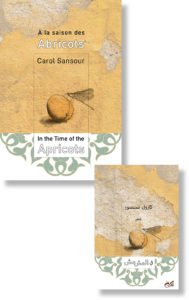Al Kotob Khan – Cairo,* December 2019, 63 pages
By Carol Sansour
In protest of his role as the poet of the resistance, Mahmoud Darwish famously said that he too wanted to write of love and flowers. It was a brave statement, but it had no effect on the perception of Palestinian poetry as an adjunct of the ongoing struggle. And judging by his continued commitment to classical language and Arab nationalism, even if his style did evolve, Darwish meant it less as a real objection than an oblique acknowledgement of his accepted position.
But if the free-verse tradition that Darwish represents created a national poetry of Palestine, which remains an abstracted, ideational country indistinguishable from the Palestinian cause, in stark and provocative contrast, here is poetry that states literally: “Palestine is not a cause.”
Carol Sansour’s acclaimed sequence of image-intense texts, In the Time of the Apricots, published with Al Kotob Khan in Cairo (December 2019), is a beautiful art object designed by Maryanne Jaraysi. It includes Sansour’s original Arabic together with Youssef Rakha’s English translation and Henri Jules Julien’s French translation of the complete text.
In all three languages, it is immediately clear that Sansour makes no distinction between verse and prose or between literary and vernacular registers of the language. She uses what is at her disposal, including Darwish’s legacy, to present the picture of a self, a human being, a woman who happens to be Palestinian. And in the process, she conflates two distinct concepts – the nation and the homeland – underlining the conflict between them, which free verse glosses over, and so evokes a gritty and credible place where people live unhindered by ideology or angst.
“It may be that the idea of Arab nationalism precisely is the idea of the state of Israel…”
Sansour’s Palestine is a place of nature and of intimacies, small things performing on small stages: the household, the church, “the swing on our high balcony”… Hers is a post-national discourse of belonging by necessity which, in its truth aesthetic, speaks as eloquently to the human condition as the best free verse. Here, for real, is writing about love and flowers.
* Soon to be available on www.jamalon.com.


